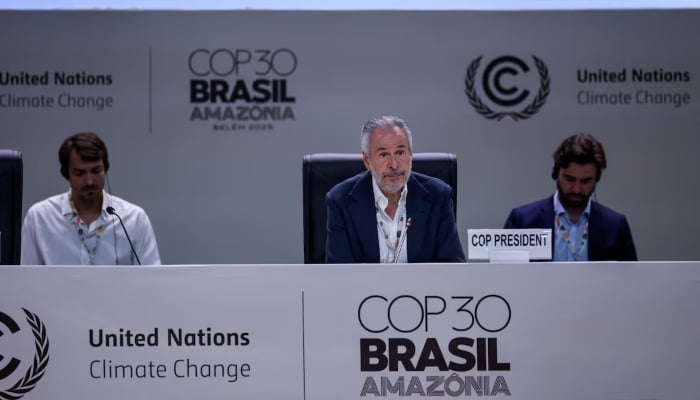Politics
COP30 climate summit deadlocked as EU rejects draft deal

- Draft COP30 deal omits fossil fuel transition plans.
- Arab Group says energy industries off limits, sources say.
- Developing nations demand stronger deal on funding.
BELEM: The outcome of Brazil’s COP30 climate summit was left hanging in the balance, with the European Union refusing to accept a draft deal it said would fail to advance global efforts to curb greenhouse gas emissions driving climate change.
The two-week conference being held in the Amazon city of Belem had been scheduled to end Friday evening, but blew past that deadline as negotiations continued late into the night.
Brazil has cast the summit as a make-or-break moment for global climate cooperation, urging nations to bridge divides on issues including the future of fossil fuels and to send a message that concerted global action is the best way forward.
“This cannot be an agenda that divides us,” COP30 President Andre Correa do Lago told delegates in a public plenary session before releasing them for further negotiations.
“We must reach an agreement between us.”
Some emerging economies hit back at the EU’s position, demanding the bloc commit more finance to help poorer nations cope with climate change.
“We can’t just work with one pathway. If there is a pathway for fossil fuel, there has to be a pathway for climate finance as well,” said a negotiator for a developing country, who was granted anonymity to discuss the closed-door negotiations.
The rifts over fossil fuels, cutting CO2 emissions faster and finance highlighted the difficulty of reaching a consensus at the annual conference, a perennial test of global resolve to avert the worst impacts of global warming.
A draft text for a deal, released by Brazil before dawn on Friday, contained no reference to fossil fuels, dropping a range of options on the subject that had been included in an earlier version.
Scores of countries, including major oil and gas producer nations, had opposed the options.
Earlier in the summit, some 80 governments had demanded COP30 deliver a plan to shift away from fossil fuels. But by Friday night, many of those nations had indicated in closed-door talks they would accept the deal without it, negotiators said.
Burning fossil fuels emits greenhouse gases that are by far the largest contributors to global warming.
Standoff over fossil fuels
The 27-member EU said the text was too weak.
“Under no circumstances are we going to accept this,” EU Commissioner for Climate Wopke Hoekstra said in a statement on Friday.
The EU indicated it could “move beyond its comfort zone” on finance for developing nations – but only if the text’s sections on action to cut planet-warming emissions were strengthened.
By Friday night, some European negotiators said the bloc was considering the option of walking away from the talks, rather than accepting the current deal.
A Brazilian negotiator told Reuters the fossil fuel language was unlikely to be reintroduced, and that the summit presidency was pressing for only small adjustments to the existing draft.
Other options being discussed by negotiators included a separate side deal on fossil fuels, which countries could voluntarily sign up to but which would not be agreed by consensus as COP deals need to be, negotiators said.
Three sources said the Arab Group negotiating bloc, whose 22 members include Saudi Arabia and the United Arab Emirates, told a closed-door meeting of negotiators that its energy industries were off limits in discussions.
Saudi Arabia delivered a statement from the Arab Group to negotiators, warning that targeting its industries would collapse the negotiations, the sources said.
Saudi Arabia did not reply to a request for comment addressed to the Saudi government communications office.
Multilateralism under pressure
The draft deal also called for global efforts to triple the financing available to help nations adapt to climate change by 2030, from 2025 levels.
However, it did not specify whether this money would be provided directly by wealthy nations, or other sources including development banks or the private sector.
A deal text would need approval by consensus among the nearly 200 countries present in order to be adopted.
Correa do Lago said a show of multilateral unity was an important signal to send given this year’s US absence. President Donald Trump has called global warming a hoax.
“The world is watching,” Correa do Lago said.